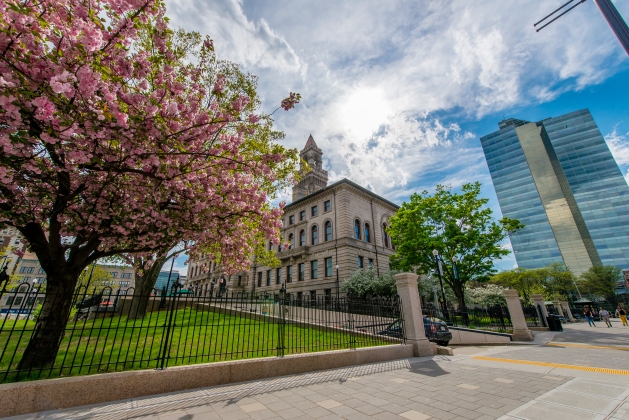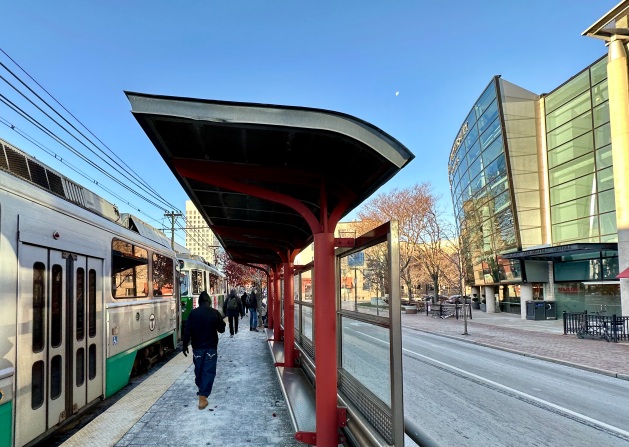
Canadian wildfire smoke in Minneapolis, May 2023. Photo (cc) 2023 by Chad Davis.
One of my favorite exercises in my media ethics classes is to ask students to identify news stories that they think have been undercovered. They always come up with thought-provoking material. Some stories got little or no attention; others were covered a great deal, but perhaps not quite as much as they should have been or with the wrong emphasis. I’ve got a big class this fall, and I can’t share everything, but I thought you’d enjoy reading a few highlights.
• Digging deeper on wildfires. How could this summer’s wildfires have been covered any more than they already were? Every day we saw smoky haze drifting in from Canada, on TV, on news sites and, needless to say, in real life. But did you know that air pollution from such fires in the past few years has been so pervasive that decades’ worth of progress on air quality was undone? And that doesn’t even count data from 2023. (Source: New York Times)
• The aftermath of the Maui fires. Again, what more is there to know? Well, quite a lot, as it turns out. The media have moved on, but Hawaiians are continuing to cope with the deadly fires, which destroyed the historic city of Lahaina. Among other things, we still don’t know what, exactly, caused the fires, and Hawaii will remain vulnerable to such events in the future because climate change has made the islands hotter and drier. (Source: New York Times)
• Money for veterans is missing. Now here’s a story that I haven’t seen anywhere else. The Massachusetts Veterans of Foreign Wars is demanding that a judge order VFW Post 144 to produce its financial records so an audit can be conducted into money that the post has collected in recent years. According to the state VFW, several hundred thousand dollars is unaccounted for, and some of it was intended to help veterans in need. (Source: Universal Hub)
• An unnoticed border closing. While the border between the U.S. and Mexico remains the focus of political wrangling, there have been relatively few reports that the Dominican Republican has closed its border with Haiti. It’s a story of great interest in Boston, as the city is home to large communities of immigrants from both countries — prompting Boston Globe columnist Marcela García to write about the situation recently. (Source: Washington Post)
• Mexico decriminalizes abortion. The Mexican Supreme Court ruled recently that laws criminalizing abortion were unconstitutional, a significant step forward for reproductive freedom in that country. And with a number of states in the U.S. outlawing abortion following the end of Roe v. Wade, we can expect that many American women will seek abortions south of the border. (Source: New York Times)
• The tip of the iceberg. The whole world watched in revulsion when now-former Spanish soccer president Luis Rubiales kissed Jenni Hermosos on the lips without her consent after the Spanish women’s soccer team won the World Cup. But that was not all the athletes had to overcome. The team was in revolt against its coach, Jorge Vilda, and star player Alexia Putellas was hampered by injuries. Still, they persisted. (Source: New York Times)
• Cheating low-paid workers. The San Francisco Unified School District failed to pay more than 800 of its lowest-paid workers this past July, telling them that a payroll screw-up meant that their compensation would be delayed for two weeks. Those affected — lunch servers, janitors and clerks — earn an average salary of between $55,000 and $64,000 a year in one of the highest-cost cities in the country. (Source: Mission Local)
• The opioid epidemic continues. According to researchers, the opioid epidemic is now in the midst of a “fourth wave” because of the rise in fentanyl-related overdoses. The fentanyl crisis receives regular coverage, but the extent of it, driven by mixing fentanyl with stimulants such as cocaine or methamphetamine, is not widely understood. The crisis resulted in overdose deaths exceeding 100,000 in 2021, the first time it had passed the six-digit mark. (Source: NBC News)
• Misunderstanding sexual racism. The Boston Globe has covered several stories involving sexual assaults against Asian and Asian American women but, according to one of our students, mischaracterizes those assaults as hate crimes. They are that, of course, but our student says they should also be be understood as examples of sexual racism. To do otherwise “fundamentally misunderstands the way that Asian women experience racism in the U.S.” (Source: New York Times)
• An incomplete education. Across the country, right-wing authorities in states and communities have banned what they call critical race theory (an esoteric concept generally taught in graduate school), resulting in less education about Black history. This has been especially apparent in Florida, where the Stop Woke Act signed by Gov. Ron DeSantis has made it nearly impossible for public schools to engage in a rational discussion about the legacy of slavery. (Source: Time)
There were other stories as well, about the devastating floods in Libya, the state of the Boston Public Schools, the lack of broadband internet in rural areas, the Canadian House speaker who resigned after ignorantly hailing a Ukrainian Nazi, the conflict between Armenia and Azerbaijan, the ongoing crisis between the Israelis and the Palestinians, the possible end of DACA, the depletion of groundwater, and the rise of waterborne pathogens. It was an impressive list of stories, and I feel fortunate to be able to spend time with such great students.










